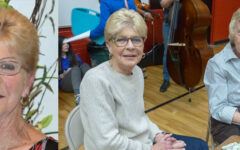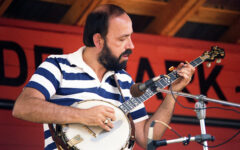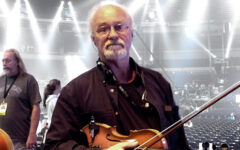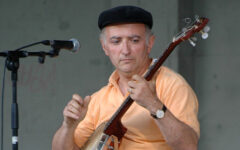
Photo of Alan Jabbour taken by Karen Jabbour – from the Old Time Herald
Fiddler and ethnomusicologist Alan Jabbour passed away at his home in Washington, DC on Friday morning, January 13, 2017, after a 15-month struggle with cancer. He was aged 74.
Jabbour, born on June 21, 1942, in Jacksonville, Florida, was a violin player from the age of seven, playing for the Jacksonville and Miami symphonies and other orchestral figurations.
Later, he attended the University of Miami playing classical music.
While a graduate student at Duke University, in the 1960s, Jabbour became interested in learning the regional fiddling style and repertory of the Upper South, and from 1965 through to 1968 he made extensive trips in North Carolina, Virginia, and West Virginia to record instrumental folk music, folksongs, and folklore.
He began documenting elderly musicians like Henry Reed, who was then in his eighties, of Glen Lyn, Virginia. Reed was known for the “note-iness” of the tunes that he played, staying closer at times to the Irish or Celtic roots of the music, certainly employing more cascades of notes and ornaments.
Fiddle Tunes of the Old Frontier: The Henry Reed Collection, an online presentation at the American Folklife Center at the Library of Congress that was published in 2000, is one product of his field work.
Along with Tommy Thompson (banjo), Bobbie Thompson (guitar), Bertram Levy (mandolin) and others, Jabbour joined in various jam sessions and music parties, usually in the rural community outside of Durham, known as Hollow Rock, where the Thompsons lived.
Out of these the Hollow Rock String Band evolved. The group was an important link in the instrumental music revival in the 1960s.
The band recorded its first album, The Hollow Rock String Band: Traditional Dance Tunes, in 1967 for Ken Davidson’s Kanawha label (Kanawha 311). It was released a year later, unfortunately before Reed, who passed away on June 16, 1968, could hear it. In 1997 it was reissued on CD by County Records (CO-CD-2715).
This record was made up of many tunes from Henry Reed such as Over the Waterfall and Kitchen Girl, among others. Reed, the group’s number one musical influence, was the source of a number of fiddle arrangements including those for Shady Grove, Cold Frosty Morning, Magpie, Green Willis, Ebenezer and Ducks in the Pond.
A second and better-quality recording was done for Rounder; The Hollow Rock String Band (Rounder 0024, originally released in 1974) featured Jabbour, Tommy Thompson and Jim Watson (guitar). The last two named went on to be part of the much celebrated Red Clay Ramblers.
The Hollow Rock String Band dissolved shortly after this LP was released.
After receiving his PhD in 1968, Jabbour taught English, folklore and ethnomusicology at UCLA. Interestingly, he found that the tunes that he played had traveled to the west coast before him.
In September 1969 he was appointed head of the Archive of Folk Song (now the Archive of Folk Culture) at the Library of Congress. There he supervised the development of the nation’s largest archival collection for folk music and folklore.
He compiled an LP drawn from earlier recordings in the Archive, which was released in 1971 as American Fiddle Tunes (now available on CD as Rounder Records 18964-1518-2).
He then moved to Washington, D.C., and for over 30 years he worked for Federal cultural agencies.
From 1969 to 1974, Jabbour was head of the Archive of Folk Song at the Library of Congress.
Subsequently, he became director of the folk arts program at the National Endowment for the Arts, where he stayed until 1976, and founding director of the Folklife Division of the Library of Congress. In that capacity, he promoted music and other folk arts, and supervised the recording of many additional roots musician – most notably the Hammons Family of Pocahontas County, West Virginia, whom he met in 1970.
In collaboration with photographer Carl Fleischhauer, Jabbour engaged in a three-year project to research, record, and photograph the history and traditions of that Appalachian family, from which came the 1973 Library of Congress double LP album The Hammons Family: A Study of a West Virginia Family’s Traditions. A companion album appeared that year on the Rounder label, entitled Shaking Down the Acorns.
Both these publications were released in a double-CD edition in 1998, entitled The Hammons Family : The Traditions of a West Virginia Family and Their Friends (Rounder 1504/05).
In April 1974, he moved to the National Endowment for the Arts to become founding director of that agency’s grant-giving program in folk arts. Under his direction the Folk Arts Program grew rapidly as a source of funding for the varieties of folk cultural expression in the United States, and it continued to grow after his departure in 1976.
In August 1976 Jabbour became the founding director of the American Folklife Center, the principal repository for field documentation of American folklore and folklife, continuing in that position for 23 years until he stepped down in mid-1999.
In 1977 he founded the Festival of American Fiddle Tunes, staged in Port Townsend, Washington, one of the largest celebrations of traditional music west of the Mississippi.
During the 1980s he occasionally turned his attentions to editing folk music documentary albums and playing music at occasional public events and gatherings.
At the beginning of that decade Jabbour with Tommy Thompson helped pianist and guitar player Sandy Bradley, a friend from Jabbour’s brief spell at UCLA, recorded old-time fiddle and banjo tunes, released on Sandy’s Fancy on Flying Fish (FF 260, in 1981).
Jabbour retired from federal service at the end of 1999; at the same time he established the Henry Reed Fund for Folk Artists.
Since his retirement, he has turned enthusiastically to a life of writing, consulting, lecturing, and playing the fiddle.
In 2002 he released a new CD of his own fiddling, joined by Bertram Levy and James Reed, Henry’s son, entitled A Henry Reed Reunion.
For much of the past 15 years Jabbour toured with old-time banjo picker Ken Perlman, with whom he played on an album entitled Southern Summits.
Following that he released You Can’t Beat the Classics with Ken Perlman (banjo) and Jim Watson (guitar).
Throughout his career, Jabbour served on numerous panels and boards, including the D.C. Humanities Council (co-chair, 1987–88), the American Folklore Society (president, 1988), the Fund for Folk Culture (chair, 1991–94), the National Coalition for Heritage Areas (1993–97), the European Center for Traditional Culture (1996–98), and the Alliance for American Quilts (1996- ).
He was president of the American Folklore Society, a Fellow of the American Folklore Society, and even a president of the Fellows of the American Folklore Society.
Jabbour was published widely on the subject of folklore and folklife, including a number of publications on American folksong and instrumental folk music. He has also been featured on other recordings and in numerous festivals and concerts as a performer on the fiddle.
He was the presenter and regular performer at Breakin’ Up Winter, staged in the Lebanon State Park, near Lebanon, Tennessee, about 30 miles east of Nashville.
In 2003 he received the Benjamin A. Botkin Prize from the American Folklore Society for outstanding achievement in public folklore.
In 2004 Alan Jabbour and his wife, Karen Singer Jabbour, a photographer, began to do research on the cultural tradition of cemetery decoration, ultimately putting together Decoration Day in the Mountains: Traditions of Cemetery Decoration in the Southern Appalachians. The book was published by Chapel Hill: University of North Carolina Press in 2010.
Jabbour has been variously described as intelligent, thoughtful, charming, a delightful human being and a true gentleman, who in the animated way that he played the fiddle displayed great joy in the tunes that he had rescued and shared with the music community.
Here’s an example of his combined passions as an archivist, a storyteller, and a fiddler during a presentation at the Albuquerque Academy in 2014.
R.I.P., Alan Jabbour.







